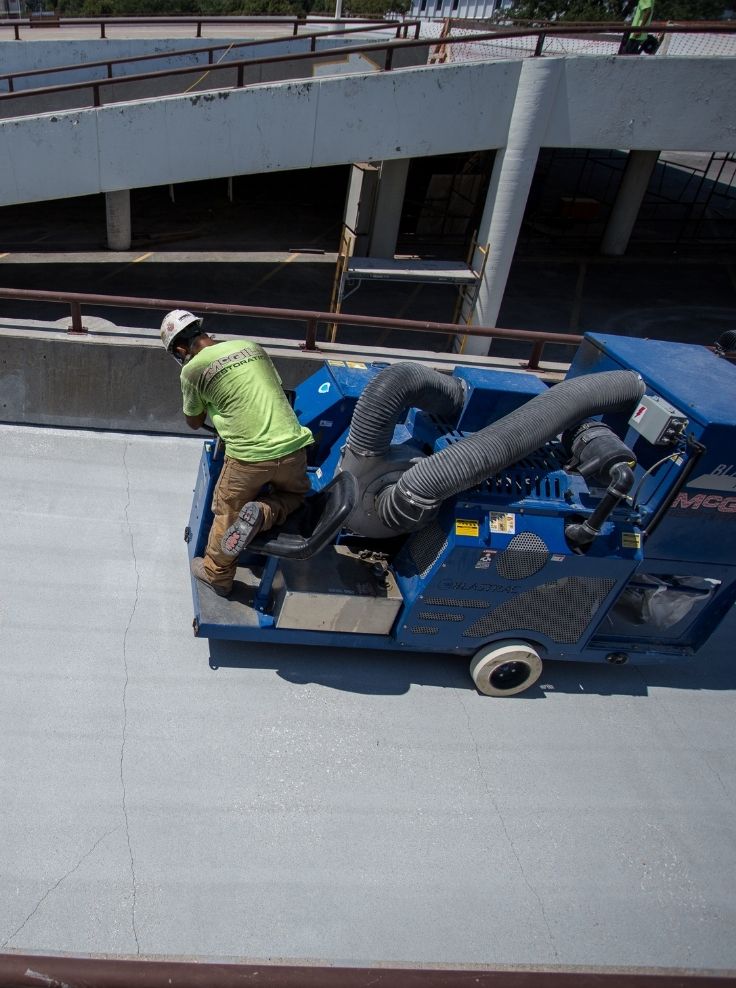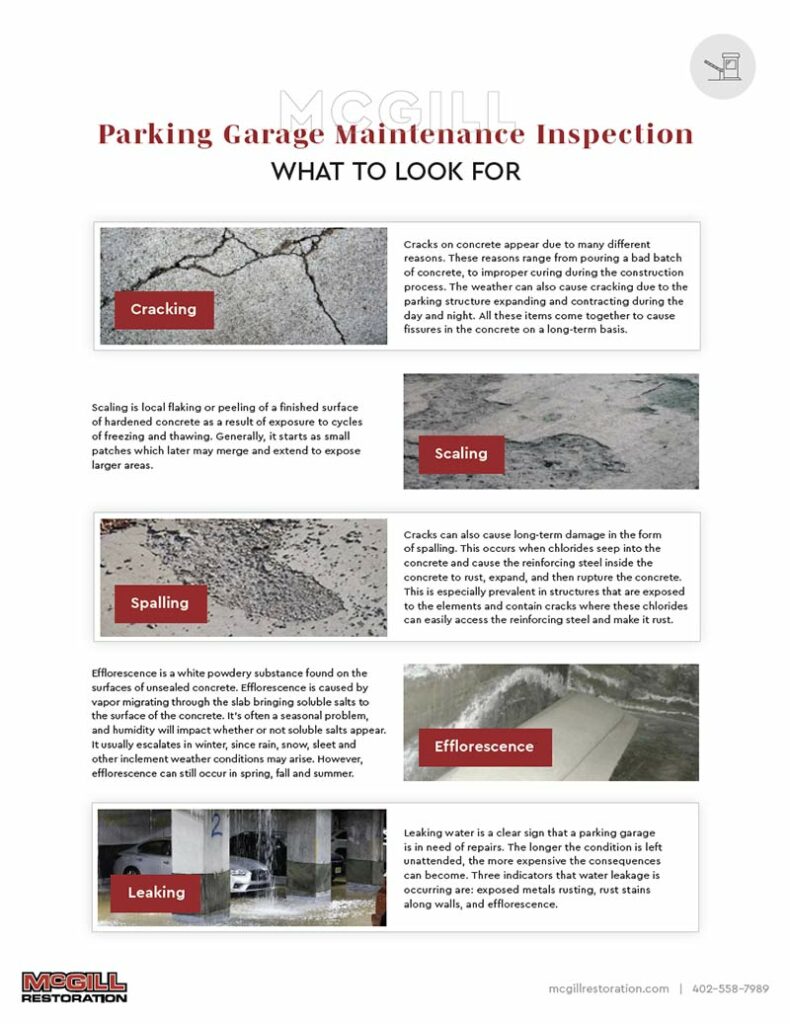Parking garages are a reliable source of revenue for commercial properties. Customers, residents, visitors, and guests are willing to pay for the convenience of covered parking. But like any asset, your parking garage could lose value if you fall behind in upkeep and preventative maintenance.
Follow these preventative maintenance tips from McGill Restoration to:
- Extend the service life of an original or renovated structure
- Maintain profitability with uninterrupted service
- Avoid preventable repairs or problems
- Protect your assets’ reputation and value for resale or lease
McGill Restoration offers these best practices to help prolong your parking garage’s service life and value.
Stick to a Regular Maintenance Schedule
Parking garages are exposed to extreme temperatures, traffic, and moisture. Midwest parking structures are also exposed to harsh deicing chemicals and snowplow blades. Vehicles grind abrasive materials into concrete, leading to premature aging of bare and treated floors.
Fortunately, regular maintenance and annual inspections can help property managers mitigate these risks. Here are six simple ways to keep your asset safe, secure, and profitable.
#1. Spring Clean to Remove Harmful Winter Chemicals
Even if you have treated concrete, we recommend a yearly power wash after the season’s last snow to remove road salt, sand, and other deicing agents. An annual floor cleaning also removes oil and grease that can stain or damage concrete. At an average cost of approximately $1 per square foot, power washing is a simple, cost-effective way to extend the service life of your garage.
Remember to include stairwells and entrances in your spring cleaning. Pedestrians track road salt, sand, dirt, and oil into these areas. Cleaning and freshening public areas help increase customer satisfaction and loyalty, too.
#2. Avoid Certain Deicers
Although effective against snow and ice, sodium chloride – road salt — is corrosive. Deicing agents with sodium chloride damages concrete if allowed to permeate the surface for long periods. Use sand or gravel when possible.
Avoid Deicers that Contain These Chemicals
The Iowa Concrete Paving Association advises against deicing agents that contain:
- Ammonium sulfate
- Ammonium nitrate
- Calcium chloride
- Magnesium chloride
- Magnesium acetate
- Magnesium nitrate
According to the ICPA, these chemicals are highly damaging to concrete.
#3. Inspect Joints for Deterioration
The average service life for joint sealants in parking structures is four to six years, including joint sealants designed for wet, freezing conditions. Excessive wear, such as snow removal, may cause premature deterioration. Look for areas where the sealant sags or peels away from the sides of the joint. Another warning sign of joint damage is cuts or holes down the center.
#4. Take a Close Look at Traffic Coating
Treated concrete helps prolong service life, but it should be inspected yearly or after snow removal. The biggest threats to traffic coating include:
- Continuous tire turning or tire rotation
- Heavy braking
- Damage and rust stains from snow blades
The constant pressure and grinding from vehicles weakens, degrades, or cuts traffic coating over time.
Tips to Reduce Snow Blade Damage
Snow removal equipment is a welcome sight when flakes are flying, but sharp blades easily damage coated and bare decks.
Here are tips to reduce damage from snowplows:
- Use warning markings on expansion joints that are visible even when the deck is covered with snow.
- Approach expansion joints with caution, keeping a 75 degree or less angle.
- Use composite guards to protect surfaces from gouges and scratches.
- Prevent concrete cracks by promptly removing wet, heavy piles of snow.
#5. Check Concrete for Signs of Deterioration
Concrete is both durable and vulnerable. The most common causes for damaged concrete include the freeze/thaw cycle, snow removal equipment, chemicals, and constant traffic.
What to look for:
Cracks
Cracks are caused by expanding and contracting as temperatures rise and fall. A bad batch of concrete, or improperly cured concrete, can also cause cracking.
Scaling
Scaling is another type of damage caused by changes in temperature. If unchecked, scaling spreads, leaving concrete exposed to further decay.
Spalling
Spalling is caused by sodium chloride (road salt) that seeps into cracks or weakened surfaces. This type of damage occurs most frequently in areas with direct exposure to weather.
Efflorescence
Efflorescence is a white powdery substance caused by salt vapors collected on untreated concrete. Although more commonly seen in the winter, efflorescence may occur in the spring and summer.
Some concrete damage is harder to detect. Concrete that makes a hollow sound upon impact could signify deterioration.
McGill Restoration has a free parking garage inspection checklist that you can download here.
#6. Evaluate Elevators and Stairwells
It’s easy to focus only on parking stalls and ramps. But don’t forget about high traffic pedestrian areas, too. As parking garage restoration experts, we know that tenants and guests place a significant value on cleanliness and lighting in elevators and stairwells. Consumers don’t expect these areas to be fancy, but they should be well-maintained.
Regularly evaluate elevators and stair towers to avoid expensive repairs or costly downtime. You should check the floor and ceiling of elevator cars and inspect the shaft itself. Take a close look at stairwells for leaks, cracks, and other signs of deterioration.
Preventative Maintenance Checklist
This checklist helps keep track of critical areas for yearly preventative maintenance.
- Cracking, scaling, or spalling of concrete
- Rust spots on concrete
- Rusting feet or footings on hand railings
- Water in elevator shafts or signs of leaking in elevator shafts
- Efflorescence, ponding water, or leaking on decks
- Exposed steel or rebar
- Sagging, torn, or loose joint sealant
- Failing or damaged traffic coating
- Faded or failing line stripes or pavement markings
Sooner or later, parking structures need maintenance or restoration beyond the basic yearly inspection. McGill Restoration helps property managers protect their assets. For a free estimate or more information, reach out online, follow us on social, or call (402) 558-7989.



